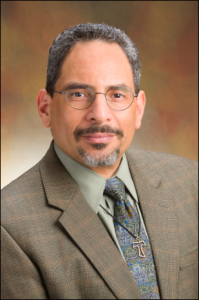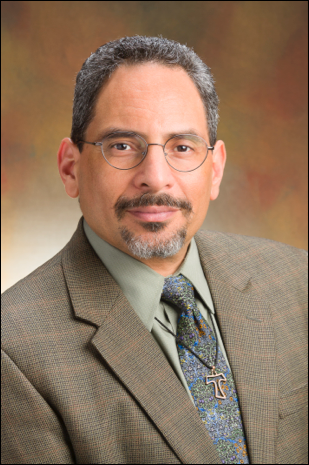Intersections and Their Discontents – by Tony De La Rosa
 My home congregation is like many an inner-city congregation in the PCUSA; historically, an exclusively Anglo group of believers who commuted from throughout the city to worship a distinctly upper-middle class God. The well-heeled congregation of that era was a mega-church of its day, and in the same year that saw the beginning of the Great Depression, its four thousand members dedicated a cathedral complex on a grand urban boulevard to house its substantial mission and outreach programs to the City of the Angels. Today, we are a more diminutive worshipping community, and though we remain just as committed to mission and outreach as our forbearers, we do so on a reduced scale as our limited membership and financial resources allow.
My home congregation is like many an inner-city congregation in the PCUSA; historically, an exclusively Anglo group of believers who commuted from throughout the city to worship a distinctly upper-middle class God. The well-heeled congregation of that era was a mega-church of its day, and in the same year that saw the beginning of the Great Depression, its four thousand members dedicated a cathedral complex on a grand urban boulevard to house its substantial mission and outreach programs to the City of the Angels. Today, we are a more diminutive worshipping community, and though we remain just as committed to mission and outreach as our forbearers, we do so on a reduced scale as our limited membership and financial resources allow.
My church also embraces vastly more diversity than in its pre-Crash heyday in almost every demographic category: race, ethnicity, class, national origin, and now, sexual orientation and gender identity. We have no ethnic majority, and even a plurality is difficult to discern. Our bilingual worship lifts up the varied English and Spanish-speaking capabilities of our congregants. On Sunday mornings, our skilled worship leaders readily translate off-the-cuff where the PowerPoint projections do not, and we sing songs of praise from every continent, often in their original tongues.
Our elected leadership is similarly diverse, and officers are sought from throughout the congregation’s makeup. Our session seeks to be particularly inclusive, with all their meetings conducted with simultaneous live Spanish/English translation. In fact, our congregational nominating committee – only half-jokingly — perpetuates an “affirmative action” slot on the session for a married, heterosexual, white male. (He does a fine job.)
Our church website and outreach materials describe who we are succinctly: “An Intersection of Cultures, Spirit and Justice.” We relish calling ourselves an “intersection,” because the course of our faith-filled lives has led each of us to our very unique faith community. We see our intersection as a natural gathering place, a crossroads of persons on their journey of faith, and we are blessed beyond measure to be gifted with so many going and coming in so many directions.
The considerations led the early Church to expand into the metropolitan centers of the ancient world, where it encountered success among the crossroads of armies, traders and wayfarers. These cultural intersections bore fruit in mixed and varied congregations, places like my home congregation where diverse people of faith brought their equally diverse life experiences and worldviews. Paul and his company of rag-tag, polyglot evangelists were no fools. They recognized that the organizational, as well as spiritual, development opportunities were endless where cultures, ethnicity and social classes crossed paths. Indeed, all of Christendom owes its origin to the multicultural predispositions of those evangelists.
Yet, intersections can be dangerous places.
Traffic coursing in opposite and conflicting directions necessitates some form of order to maintain safety for all, to assure that the varied movements from A to B and B to A do not collide and interrupt the flow of communication and commerce. Add more traffic and directions and travelers and agendas, and maintaining order for the good of all becomes daunting.
The multicultural community of the Church is no different. As with any multicultural collective, the tendency toward chaos and disorder exponentially increases with each new element of diversity added to the mix. Quite simply the opportunities for clash and conflict multiply as the points of interaction increase. But for the communal commitment to unity and the infusion of inspired leadership to bring and maintain an overarching sense of order, systemic entropy threatens to undermine the enterprise of a truly universal Church.
Even our best efforts to foster comfort and wholeness to the community can go awry, despite our best intentions. Music, food, touch and even childcare in a multicultural setting can serve as flashpoints for discord instead of nurturing loving relationships. Add to these the burgeoning witness of the lesbian, gay, bisexual, transgender and queer communities both within and outside the church, and the atmosphere can become outright incendiary.
Just as the possibilities for growth and development seemed endless, so were the accompanying challenges and minefields of risky co-existence. The Church stands in a precarious place: a busy intersection of God’s people, careening about on their respective life journeys, seeking a Savior to order the chaos. Many risk-averse faith communities avoid the crises that diversity affords by shirking the duty to embrace all. Preserving homogeneity comes at the expense of welcoming homosexuals – or anyone else who would confront the paradigms of the privileged. Even in my home church, despite our notable commitment to welcome all, a few in the congregation fret about the increasing Asian presence in our neighborhood. The talk turns to discussion of “them” and “us,” and how can we survive in the face of this new demographic onslaught from without.
I have no doubt we will survive. We have Christ at our center, and Christ prevails. Life in Christ may not be easy. It rarely is. But it is eternal, and eternity contemplates change with the passage of time. As members of Christ’s body, we choose to live in the seemingly dangerous intersections of our world because we become transformed by the glory of God’s diverse creation being in proximity, and we are so much the better for it.
**********
The challenge and promise of the multicultural Church are the subjects of this week’s postings on Ecclesio, with particular focus on the challenge and promise that welcoming of LGBTQs into full communion may entail. With major socio-political upheavals in our nation and our world occurring daily, the Church’s ability to navigate social change effectively will shape the proclamation of the gospel for generations to come. Instead of navigating change, can the church become an effective agent of constructive and prophetic social change.
Eric Thomas, Director of Christian Education at the First Presbyterian Church of Brooklyn, New York, and the Reverend Kelle Brown, Pastor of Church of Mary Magdalene in Seattle, Washington, will be joining the conversation about these issues during what promises to be a week of stirring reflection and calls to action. In many ways, this week’s exchange is a continuation of a panel discussion on LGBTQ witness and racial/ethnic communities in which Eric, Kelle and I took part. The program was held at the Presbyterian Church (U.S.A) General Assembly in Detroit in June of this year and sponsored by More Light Presbyterians. Both Eric and Kelle currently serve on the Board of Directors of MLP, and all three of us wish to acknowledge our deepest gratitude to MLP and especially its Executive Director, Alex Patchin McNeill, and Board Co-Moderator, Ruling Elder Nathan Sobers, for having invited us to participate in the original panel. We give thanks to God for them and their tireless efforts to include everyone in Christ’s Church.
Ruling Elder Tony De La Rosa is the former Interim Executive Presbyter of the Presbytery of New York City. Prior to his work in New York City, Tony served as the Associate Counsel and Director of Board Administration of L.A. Care Health Plan, the nation’s largest public HMO, with over 1.2 million Medicaid, S-CHP and Medicare members. In the 1990s, Tony was the Executive Director of the Los Angeles Center for Law and Justice, legal services agency dedicated to addressing pressing advocacy needs for the predominantly Latino communities of East and Northeast Los Angeles.
A lifelong Presbyterian, Tony is the former Clerk of Session at Immanuel Presbyterian Church of Los Angeles, and he has volunteered for over 20 years on various General Assembly-level entities, including the Advisory Committee on Litigation (as a charter member), the Special Committee on Church-wide Compensation Policy Guidelines, and more recently on the Special Committee to Study Issues of Civil Union and Christian Marriage that reported to the 219th General Assembly in 2010. Most recently, he joined the Board of Pensions as a Director in 2012. Tony received his Bachelor of Arts, Master of Divinity and Juris Doctor degrees from Yale University. He and his partner of seven years, Michael Bendgen, currently reside in Los Angeles.

